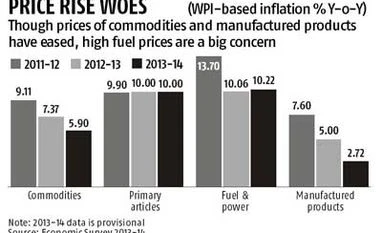Deregulation of diesel prices, power sector reforms, linking the rural job guarantee scheme's wages to productive projects and tight fiscal consolidation are the priority measures that should be taken to tackle high inflation, Economic Survey, 2013-14, said.
It also said ending the open-ended food procurement by Food Corporation of India (FCI) and setting time-bound targets under the Fiscal Responsibility and Budget Management (FRBM) Act, apart from moving towards creating a national market for agricultural commodities, are other strategies that could control price rise.
The observations were made as the country stares at a 71 per cent probability of sub-normal monsoon, high oil prices and exchange rate volatility. These are hurdles in the government's plan to bring down inflation.
"The government has to work towards a low and stable inflation rate through fiscal consolidation, moving towards establishing a monetary policy framework and creating a conducive environment for a competitive national market for food," the Survey said. Initiation of reforms on these fronts will reduce inflation uncertainty and restore stable business environment, it said.
In its first Economic Survey, the Narendra Modi-led government said the Wholesale Price Index-based inflation might come down by the end of 2014, giving room to the Reserve Bank of India (RBI) to ease its tight monetary stance by the end of 2014-15.
Acknowledging the challenging tasks in controlling inflation, mainly those relating to food prices, the Survey said cereal markets have resource mis-allocation due to government interference in every aspect. "Food inflation has remained a major driver of inflation since 2011," the Survey said.
While farmers can be incentivised by gradually removing restrictions on exports, it said, FCI can learn to procure stocks from markets more efficiently and manage risks through futures market.
It also said ending the open-ended food procurement by Food Corporation of India (FCI) and setting time-bound targets under the Fiscal Responsibility and Budget Management (FRBM) Act, apart from moving towards creating a national market for agricultural commodities, are other strategies that could control price rise.
The observations were made as the country stares at a 71 per cent probability of sub-normal monsoon, high oil prices and exchange rate volatility. These are hurdles in the government's plan to bring down inflation.
"The government has to work towards a low and stable inflation rate through fiscal consolidation, moving towards establishing a monetary policy framework and creating a conducive environment for a competitive national market for food," the Survey said. Initiation of reforms on these fronts will reduce inflation uncertainty and restore stable business environment, it said.
In its first Economic Survey, the Narendra Modi-led government said the Wholesale Price Index-based inflation might come down by the end of 2014, giving room to the Reserve Bank of India (RBI) to ease its tight monetary stance by the end of 2014-15.
Acknowledging the challenging tasks in controlling inflation, mainly those relating to food prices, the Survey said cereal markets have resource mis-allocation due to government interference in every aspect. "Food inflation has remained a major driver of inflation since 2011," the Survey said.
While farmers can be incentivised by gradually removing restrictions on exports, it said, FCI can learn to procure stocks from markets more efficiently and manage risks through futures market.
)